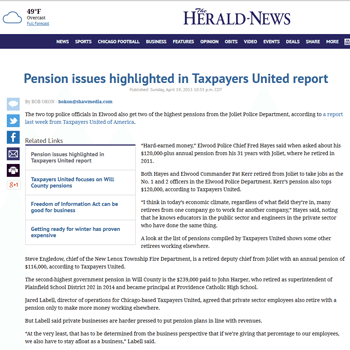Taxpayers United of America’s operations director, Jared Labell, was quoted by Quad-City Times in an article about Taxpayers United of America’s recent pension release for both Rock Island County and Moline.
Visit website to see pension information
According to Jared Labell, of the Taxpayers United of America organization, the group’s website lists individual pensions of Rock Island and Moline municipal, Rock Island County, Rock Island County government teachers and Black Hawk College retirees. Visit www.taxpayersunited.org to see the list.
Rock Island County taxpayers bear the burden of millions of dollars in pensions that retired educators and municipal workers will collect for years to come, according to a Chicago-based taxpayers group.
Taxpayers United of America made a presentation on that contention — one of several presentations throughout the state — Wednesday at the Rock Island Holiday Inn.
But a representative from the American Federation of State, County and Municipal Employees, or AFSCME, counters that most Illinois retirees receive only modest pensions.
Jared Labell, operations director of the taxpayers group, said about 930 Rock Island County teachers collect at least $50,000 annually. Statewide, more than 12,000 Illinois pensioners collect six-figure pensions, and more than 85,893 retirees collect more than $50,000, he said.
“On average, these government pensioners contribute only about 5.5 percent to their own retirement payout,” he said. “In the private sector, employees pay 15 percent of every dollar they earn into Social Security for an average pension of only $15,000.”
But Anders Lindall, public affairs director at AFSCME Council 31, Chicago, calls the taxpayers group and similar organizations “pension-cutting lobby groups.”
He said the average pension in the state is $32,000 a year.
“We’re talking about the life savings of teachers, police, firefighters, nurses and other public-service workers who live in our communities throughout Illinois,” Lindall said.
Eight in 10 of those workers are ineligible for Social Security, Lindall said. “So, their modest pension is their primary, if not their only, source of income in retirement.”
When they are working, teachers, police officers and other public employees pay significantly into their own pensions, Lindall said. He said workers typically pay 8-12 percent of every paycheck toward their pension.
“The pension debt, which is real, is caused not by employees doing anything wrong; they always pay their share. It’s caused not by benefits being too expensive, and it’s certainly not caused by the few radical exceptions — outliers — that these pension-slashing lobby groups like to trot out,” Lindall said.
The taxpayer group’s Labell gave examples of local retirees with pensions near or surpassing $100,000, including Calvin D. Lee, former superintendent of Moline-Coal Valley School District, who according to the taxpayer group’s research, receives $197,826 in annual pension payments.
Another retiree, former Rock Island County Sheriff Michael T. Huff, receives $97,291 in annual pension payments, Labell said.
AFSCME’s Lindall said the pension debt was caused by legislators who didn’t set aside enough money to pay benefits. “It’s regrettable that they (the taxpayer group) attract any attention at all. They’re not adding anything productive to the conversation.”
He said it’s important to understand that the problem is the decades-long failure of politicians at the state level to set aside adequate resources.
“The answer is ending that practice and for the state to pay what it owes,” Lindall said. “Many people have talked about ways to make those costs more manageable — for example, re-amortizing the pension debt — a mathematician’s word for refinancing your mortgage.”
Creative and constitutional solutions like that that should be considered, Lindall said.
The taxpayer group’s Labell suggests putting new state employees on a 401(k) retirement plan. He emphasized that he is not demonizing people who receive pensions. Pointing out what someone is making through a pension “puts a more ‘real’ spin on it,” he said.
The average person’s Social Security pension is $15,000, he said. Compared to that, the pensions he discussed “are just astronomical,” he said.
“We are technically these peoples’ employers,” Labell said. “I think we have a right to know this information.”
Taxpayers United of America calls itself a “pro-taxpayer, nonprofit, non-partisan organization,” Labell said, adding that the organization is “not indebted” to any political party.
AFSCME represents mostly public employees at all levels of government and is the largest public employee union in the country with 1.4 million members.





